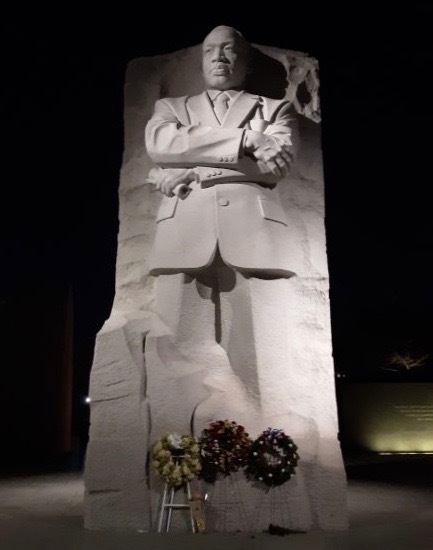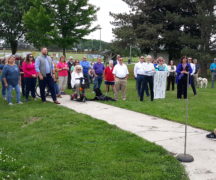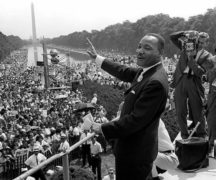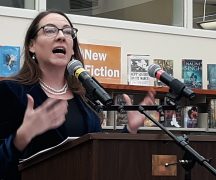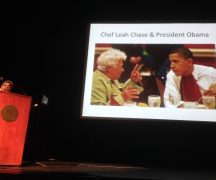By JAN LARSON McLAUGHLIN
BG Independent News
Rev. Dr. Martin Luther King Jr. is remembered for his dreams. But on the annual tribute to him Monday evening in Bowling Green, it was his reality – not his dreams – that was center stage.
His reality was that he was assassinated because of his dream for racial equality. And that reality continues today with violence and hatred still persisting, keynote speaker Jennifer McCary said during the virtual tribute to King.
McCary, the chief diversity and belonging officer at BGSU, has heard many people say “We’re better than this” or “This is not who we are.” Those comments were commonplace after Jan. 6 when insurrectionists tried to take the Capitol.
“It’s time to acknowledge who we are,” she said.
McCary rattled off a long list of mass shootings, assassinations and racial injustices in the nation.
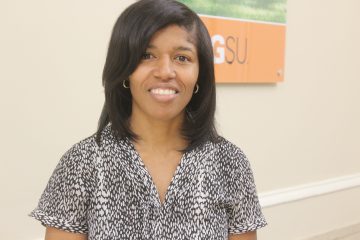
“These are the traumas inflicted in the U.S.,” she said. It’s time to admit to those wrongs, but “embrace this is not who we have to be,” she said.
The daughter of a Navy veteran, McCary said silence in the face of hatred is not the answer.
“It is OK to be critical of our nation,” she said.
“Our collective silence is what allows injustice to exist.”
McCary hears from many people who say “perhaps” someday they will step up, or “perhaps” one day their will speak out.
She suggested that “perhaps” is not good enough. Good people should not be paralyzed by the weight of the task. The road to racial justice is long and difficult, but singular steps can lead to change, she said.
“We cannot remain silent on issues that matter,” she said.
McCary quoted King’s call to action, saying “The arc of the moral universe is long, but it bends toward justice.”
She suggested that Bowling Green work to “normalize caring.” But that caring must come from more than just communities of color. Those people are “tired of caring about communities that have no love in return,” she said.
McCary told stories of kindness being change agents.
“A simple act of caring can cause an endless ripple,” she said.
McCary asked that those listening try to create that change.
“It’s time to have the audacity” to start an endless ripple, she said. “Look to change something that is difficult.”
She asked those listening to make the change happen through them, not just wait for it to happen around them.
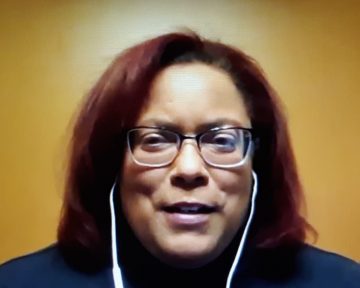
Also during the tribute, the city’s Human Relations Commission presented its Drum Major for Peace Award to Ana Brown, who is director of multicultural affairs at BGSU.
The Drum Major for Peace Award is given to a citizen of BG who has made significant efforts to further the betterment of human relations by actively promoting justice, peace, and respect, and who exemplifies King’s character and values of courage, truth, compassion, dignity, humility, and service.
Brown has been a member of Not In Our Town Bowling Green since its inception in 2013.
Dawn Shinew, co-chair of Not In Our Town, talked about the organization’s commitment to speak out against hatred and intolerance in the community. She talked about the rise of extremism and hatred, and the divisions that appear to be getting deeper and wider.
Then she talked about Brown, and her ability to educate people with gentleness and strength.
“She often works quietly behind the scenes, shunning the limelight, but making good things happen,” Shinew said of Brown.
Brown said she learned early from her parents and sister about “living a life in service.”
“It feels odd for me to be recognized for doing something I feel I’m supposed to be doing,” she said.
Brown remembered King’s words about being important and famous, but treasures his words about being great.
“Everybody can be great, because everyone can serve,” she said. “Look at ways we can make differences in small ways” that will add up to great ways.

Also speaking during the tribute was U.S. Sen. Sherrod Brown, D-Ohio, who talked about the events of Jan. 6.
“We bore witness to the best of our country and the worst,” he said.
The best occurred in Georgia, where voters elected two senators – one a black minister and the other a Jewish man.
The worst occurred in the nation’s capital, when insurgents hung a noose on the grounds of the Capitol Building, and carried Confederate flags inside – “all with impunity,” Brown said.
The silence of leaders in the face of a “racist president” led to that moment on Jan. 6, he said. The silence in the face of “very fine people one both sides” in Charlottesville, fed the hatred.
“The power of life and death is in the tongue,” Brown said. That was something King knew well. “He moved mountains with his words.”
“It must be our work to heal the country,” Brown encouraged, quoting the words of another civil rights icon John Lewis. “Make good, necessary trouble.”
Welcoming the audience Monday evening was Mayor Mike Aspacher, who talked about King’s ability to bring hope to the nation.
“The power of his words still resonate with us today,” Aspacher said. His words still inspire the nation to reach for a better tomorrow.
And his legacy lives in Bowling Green, where the mayor committed to the “refusal to allow old prejudices to divide us.’
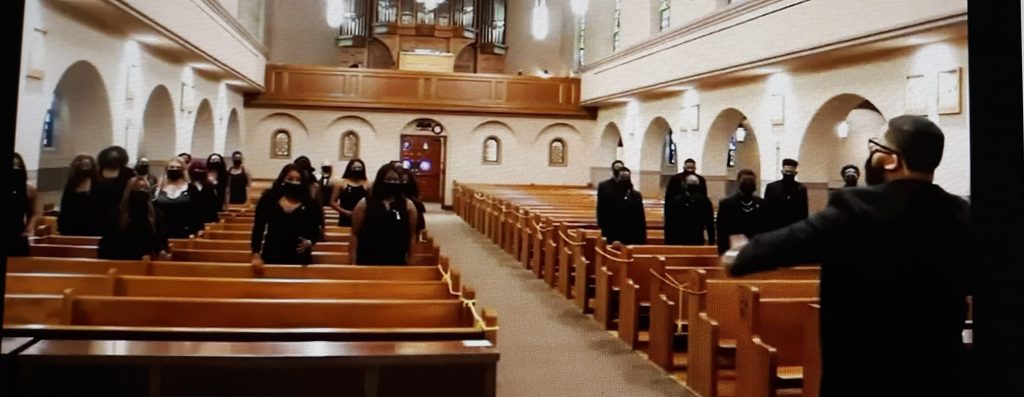
Acting as emcee for the program was Ellie Boyle, a senior at Bowling Green High School, who is also a member of the city’s Human Relations Commission.
A Negro spiritual was performed by Anthony King, and a musical selection was offered by operatic singer Shawn Mathey. Piano music was provided by Kevin McGill, director of music at St. Mark’s Lutheran Church, and the group Voices at BGSU performed two pieces.

